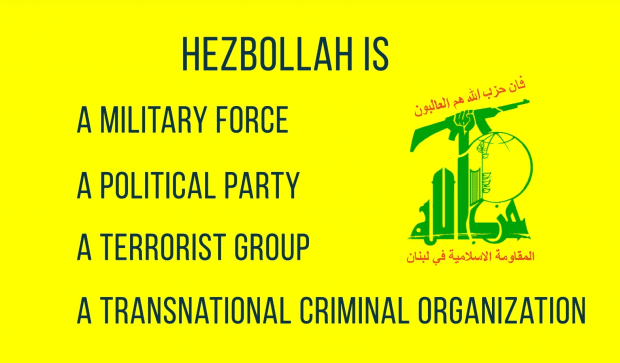What Is Hezbollah?
When listing the world’s most notorious terrorist organizations, why is it that Al-Qaeda, ISIS and Boko Haram so quickly spring to mind, while Hezbollah is frequently forgotten? In this video, Tony Badran, Research Fellow at the Foundation for Defense of Democracies, explains how the backing of Iran has served to legitimize Hezbollah on the world stage, while simultaneously making the group all the more dangerous.
Transcript
Imagine you live in a small country with more than a hundred thousand missiles pointed at it. And imagine the leaders who control those weapons had one stated purpose: to destroy you—to literally wipe your country off the map.
What would do you?
Strike first and try to destroy all the weapons? Set up an anti-missile defense system? Or would you ignore the problem and hope it goes away?
You can now stop imagining, because these are real-life questions that one country in the world has to ask itself every day.
That country is Israel.
And the leaders who control these missiles (and the number I gave is a low-ball estimate) belong to an organization known as Hezbollah—Arabic for “Party of God.” Moreover, they’re not rogue terrorists. They actually run a country—Lebanon. You should know something about them.
Hezbollah first burst onto the international scene in 1983, when they simultaneously bombed the United States Marine barracks and French paratrooper base in Beirut. 241 Americans—the largest loss of American military personnel in a single incident since World War II—and 58 Frenchmen were killed in the attacks.
But this was only the beginning.
More bombings followed, killing 24 people at the U.S. Embassy annex in Beirut in 1984; killing 85 at the Jewish Community Center in Buenos Aires in 1994; and killing 19 at a housing complex for American oil executives in Saudi Arabia in 1996.
In 1985, Hezbollah terrorists highjacked TWA Flight 847, during which they beat passengers, separated those with Jewish-sounding names, and murdered U.S. Navy diver Robert Stethem.
Hezbollah also supplied roadside bombs and helped organize groups who committed terror attacks against American forces during the Iraq War.
They routinely assassinated political rivals, most notably the former prime minister of Lebanon, Rafic Hariri in 2005.
They provoked numerous border clashes with Israel, which escalated into a war in 2006 during which Hezbollah launched thousands of rockets at civilian targets.
Today, Hezbollah is a military force, a political party, a terrorist group and a transnational criminal organization engaged in drug trafficking, money laundering, and arms smuggling.
But the most important thing to remember about Hezbollah is not Hezbollah; it’s Iran.
Hezbollah is an extension of Iran and it operates under its command.
Don’t take my word for it. Take it from the man who has been running Hezbollah for the last twenty-five years and is now the most powerful man in Lebanon, Hassan Nasrallah.
Here’s what he said in 2016:
“We are open about the fact that Hezbollah’s budget, its income, its expenses, everything it eats and drinks, its weapons and rockets, come from the Islamic Republic of Iran.”
That’s pretty much always been the case. Indeed, Hezbollah is the demon child of the Iranian Revolution.
Its founders were Iranian revolutionaries who operated out of Lebanon in the 1970s. After overthrowing the Shah of Iran in 1979, they set up Hezbollah in Lebanon. This is why in the early days, Hezbollah referred to itself as “the Islamic revolution in Lebanon.”
That definition still fits.
In the 1990s, Hezbollah added politics to its resume.
This led many scholars to claim that the group had abandoned its terrorist past and its subservience to Iran.
If only.
In truth, throughout the decade, Hezbollah extended its murderous influence into Africa and Latin America, and even into North America.
Cocaine trafficking (they got very cozy with Colombian and Mexican drug cartels), phony charity operations, and a wide variety of other criminal activities brought in more cash with which to finance their political and terror operations.
Today, Hezbollah dominates Lebanon. It directs the nation’s major domestic and foreign policy decisions, including war. It has gained control of the Lebanese parliament as well as its military and security agencies. It has also effectively turned Lebanon into an Iranian missile base.
That’s where the more than 100,000 rockets come in.
Iran is working to surround Israel with missiles capable of hitting anywhere inside the country, all while pressing ahead toward developing nuclear weapons.
As Hezbollah and Iran entrench themselves in Syria, where they’re intent on activating a new front against Israel, the likelihood they will trigger another war—more devastating than the one in 2006—is growing.
In addition, Iran has used Hezbollah to further its ambitions to become the dominant power in the region. Hezbollah operatives are deeply involved in the conflicts in Iraq and Yemen.
Since 9-11, the world has come to associate terrorist threats mainly with non-state actors like Al-Qaeda and ISIS. But unlike all these others, Hezbollah is a state enterprise. As such, the threat Hezbollah poses to the West, to Arab countries, and to Israel’s existence is different—and far more dangerous.
How do we stop Hezbollah?
The key: Stop Iran.
I’m Tony Badran, research fellow at the Foundation for Defense of Democracies, for Prager University.





